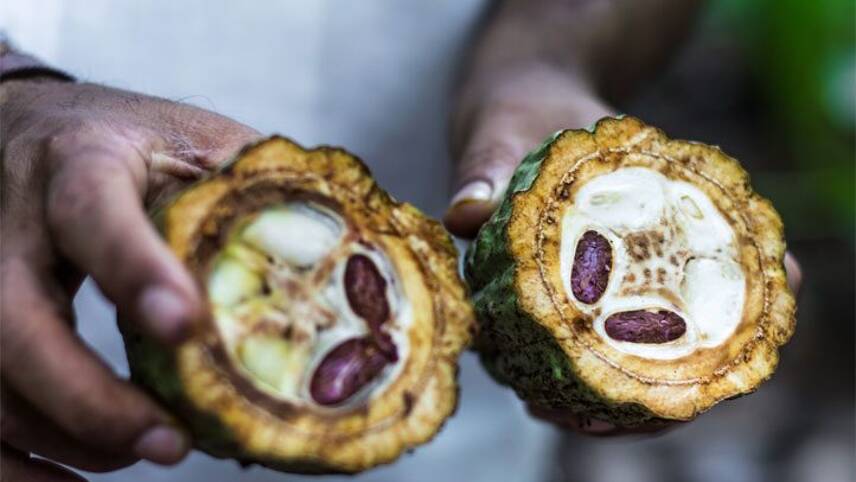Register for free and continue reading
Join our growing army of changemakers and get unlimited access to our premium content

Pictured: Fresh cocoa fruit. Stock image.
The class-action lawsuit, filed in Washington DC by International Rights Advocates, concerns eight individuals from Mali who claim that they were forced to work without pay on cocoa plantations on the Ivory Coast during the 2000s and 2010s.
These plantations regularly supplied the corporates named during the period specified, the plaintiffs claim, with the end-user businesses having a “dominant influence” on practices. While the end-user businesses did not own the farms in question, International Rights Advocates is aiming to convince the courts that they “knowingly profited” from illegal child labour.
Contracted suppliers have already admitted to courts in Africa that they cut corners in terms of protective equipment, training and checking that workers were of age in order to provide lower prices to their buyers. During fieldwork for this case, International Rights Advocates claims it routinely found children working long hours on plantations, often without enough food and with measures to keep them isolated from others. Children were also observed to use machetes and apply chemicals without protective clothing.
At the time of the alleged offences, some of the plaintiffs claim they experienced machete injuries. They also claim they were denied access to clothing and pharmaceuticals to protect them from insect bites.
They claim that they were trafficked into the cocoa sector in the first instance through trickery and deception in Mali and that, after that point, they were deprived of pay, travel documents and contact with their families.
The plaintiffs are seeking damages for forced labour and further compensation for unjust enrichment, negligent supervision and intentional infliction of emotional distress. They are also arguing that the end-user businesses have actively misled the public, overstating their commitments to tackle child labour in the supply chain. A particular point of contention was the Harkin-Engel Protocol – a voluntary industry commitment made by members of the World Cocoa Foundation, to which all the defendants belong. The Protocol initially targeted zero child labour by 2005 but the deadline has been moved to 2025.
Corporate responses
Aside from Mars and Mondelēz, which have told media outlets that they are not providing comments at this stage, all end-user businesses have publicly commented on the lawsuit.
A statement from Cargill reads: “We are aware of the filing and while we cannot comment on specifics of this case right now, [the company wants] to reinforce we have no tolerance for child labour in cocoa production. Children belong in school. They deserve safe living conditions and access to good nutrition.”
A Nestlé spokesperson said: “Child labour is unacceptable and goes against everything we stand for. Nestlé has explicit policies against it and is unwavering in our dedication to ending it. We remain committed to combatting child labour within the cocoa supply chain and addressing its root causes as part of the Nestlé Cocoa Plan and through collaborative efforts.”
Barry Callebaut highlighted its Forever Chocolate sustainability strategy, which includes a commitment to eradicate child labour in supply chains by 2025. A spokesperson for the business highlighted its work to disclose progress every year.
A Hershey spokesperson said: “We understand and agree with the concerns about the heartbreaking instances of child and forced labour. Hershey does not tolerate child or forced labour in our supply chain. These human rights violations have no place in the global cocoa industry, and we are committed to ending it. Effectively eliminating human rights violations and addressing the underlying issue of poverty that is the root cause of these labour violations requires significant investment and intervention on the ground in West Africa, not in the courts.” The spokesperson highlighted Hershey’s work to scale Child Labor Mitigation and Remediation Systems across the supply chain. At present, they cover 50% of the firm’s sourcing in Ghana and on the Ivory Coast.
Olam, similarly, provided a statement saying that it has a zero-tolerance policy for illegal child labour and other forced labour. “If we were to identify any instances, we would immediately take action which includes notifying the appropriate authorities,” the statement reads.
The bigger picture
Organisations including Unicef and the International Labour Organisation (ILO) have conducted major studies on human rights protections across the global cocoa supply chains. Findings have generally been damning, revealing that thousands of minors are likely working illegally and that adult workers are also not having their rights upheld on many plantations.
One of the most recent pieces of major research in this space comes from the US Government. Published last summer, the report revealed that cases of child labour in the supply chain have increased by 2% since 2014 to more than two million children, despite industry commitments to tackle the issue.
The Ivory Coast specifically produces about 45% of the cocoa sold globally each year.
Sarah George


Please login or Register to leave a comment.